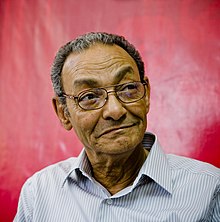Bahaa Taher
Bahaa Taher | |
|---|---|
 Bahaa Taher | |
| Born | 1935 Cairo, Egypt |
| Died | 2022/October/27th |
| Occupation | Writer |
| Language | Arabic Language |
| Nationality | Egyptian |
| Alma mater | University of Cairo |
| Genre | Novels |
| Notable awards | Arabic Booker Prize (2008) |
Bahaa Taher (Template:Lang-ar) (born 1935), sometimes transliterated as Bahaa Tahir, Baha Taher, or Baha Tahir, was an Egyptian novelist and short story writer who writes in Arabic. He was awarded the inaugural International Prize for Arabic Fiction in 2008.
Biography
Taher was born in Cairo in 1935.[1] He graduated in literature from the University of Cairo. He was one of the Egyptian artists who contributed to the avant-garde literary magazine Galerie 68.[2] Upon being banned from writing in 1975,[3] he left Egypt and travelled widely in Africa and Asia seeking work as a translator.[3] During the 1980s and 1990s he lived in Switzerland, where he worked as a translator for the United Nations.[1] Afterwards he returned to Egypt, where he continues to reside.
Novels
East of the Palms (1985) (Template:Lang-ar) His first novel was published in serialized form.[3]
Qalat Duha (1985) (Template:Lang-ar)
Aunt Safiyya and the Monastery (1991) (Template:Lang-ar) His third novel, set in Upper Egypt, concerns a blood feud as a result of which a young Muslim man, fleeing vengeance, finds sanctuary in a Coptic monastery.
Love in Exile (1995) (Template:Lang-ar) His fourth novel deals with the massacre of Palestinians at the Sabra and Shatila refugee camps in Lebanon in 1982.
The Point of Light (2001) (Template:Lang-ar)
Sunset Oasis (2007) (Template:Lang-ar) His sixth novel is set in 19th century Egypt at the beginning of the British occupation of the country. The protagonist of the book is a nationalist Egyptian police officer who suffers from an existential crisis.[4][5]
Translations
- Aunt Safiyya and the Monastery has been translated into ten languages,[3] including the 1996 English translation by Barbara Romaine.
- Love in Exile was translated into English by Farouk Abdel Wahab, the pen name of Farouk Mustafa.[6] The translation was published by American University in Cairo Press in 2001 and later reissued by Arabia Books.[7]
- Qalat Doha (As Doha Said) was translated by Peter Daniel and published by the American University in Cairo Press in 2008.
- Sunset Oasis was translated into English by Humphrey Davies and was published in the UK in 2009 by Sceptre.[8]
- Sunset Oasis was translated into Norwegian by Unn Gyda Næss and is published by Vigmostad og Bjørke. Norwegian title: "Der solen går ned", ISBN 978-82-419-0583-4.[9]
- Aunt Safiyya and the Monastery was translated into Georgian by Zviad Tskhvetiani and is published by წიგნები ბათუმში. Georgian title: დეიდა საფია და მონასტერი, ISBN 978-9941-474-10-1.[10]
Awards
- 1998 State Award of Merit in Literature, which is Egypt's highest literary award.[1]
- 2000 Italian Giuseppe Acerbi Prize for Aunt Safiyya and the Monastery.[1]
- 2008 International Prize for Arabic Fiction for Sunset Oasis. He is the first winner of this prize.[5]
Political views
In his youth he was involved in left wing causes,[1] and was a supporter of Gamal Abdel Nasser’s development program for Egypt.[3] He feels that Anwar El Sadat’s ending of this policy has been a disaster for Egypt.[3] He calls himself a pan-Arabist, but he says that he does not see much good in the Arab regimes of today.[3] He feels that Westerners want to see exoticism, gender discrimination, and problems between minorities in the works of Arab writers, but he refuses to comply with these stereotypes.[3]
References
- ^ a b c d e "Bahaa Taher". www.arabworldbooks.com. Retrieved 2018-03-18.
- ^ Ewa Machut-Mendecka (2007). "Literature-Untamed element (A proposal of a typology of the modern Arabic prose)". Studia Arabistyczne i Islamistyczne. 13: 51. Archived from the original on 19 January 2021.
- ^ a b c d e f g h "EgyptToday". EgyptToday. Retrieved 2018-03-18.
- ^ ".:Middle East Online:::". www.middle-east-online.com. Retrieved 2018-03-18.
- ^ a b Al-Ahram Weekly | Culture | Taher wins the 'Arabic Booker'
- ^ "Farouk Mustafa". Archived from the original on 2008-03-11. Retrieved 2008-03-17.
- ^ Bahaa Taher, Love in Exile. London: Arabia Books, 2008. ISBN 978-1-906697-01-3
- ^ Irvine, Lindesay (2008-03-11). "Existential crisis novel wins first 'Arabic Booker'". The Guardian. London. Retrieved 2010-04-26.
- ^ "Detaljer om bok". Vigmostad og Bjørke. Archived from the original (The page is in Norwegian. English translation: "Details about the book") on 2015-06-20. Retrieved 2009-08-19.
- ^ "დეიდა საფია და მონასტერი" (The page is in Georgian.). წიგნები ბათუმში. Retrieved 2020-07-05.
External links
- Bahaa Taher: Excerpts, articles, interviews and videos on the website of the Prague Writers' Festival
- A short profile of the writer
- An interview with the writer in Egyptian Today in which he talks about his life and Sunset Oasis Archived 2010-06-14 at the Wayback Machine
